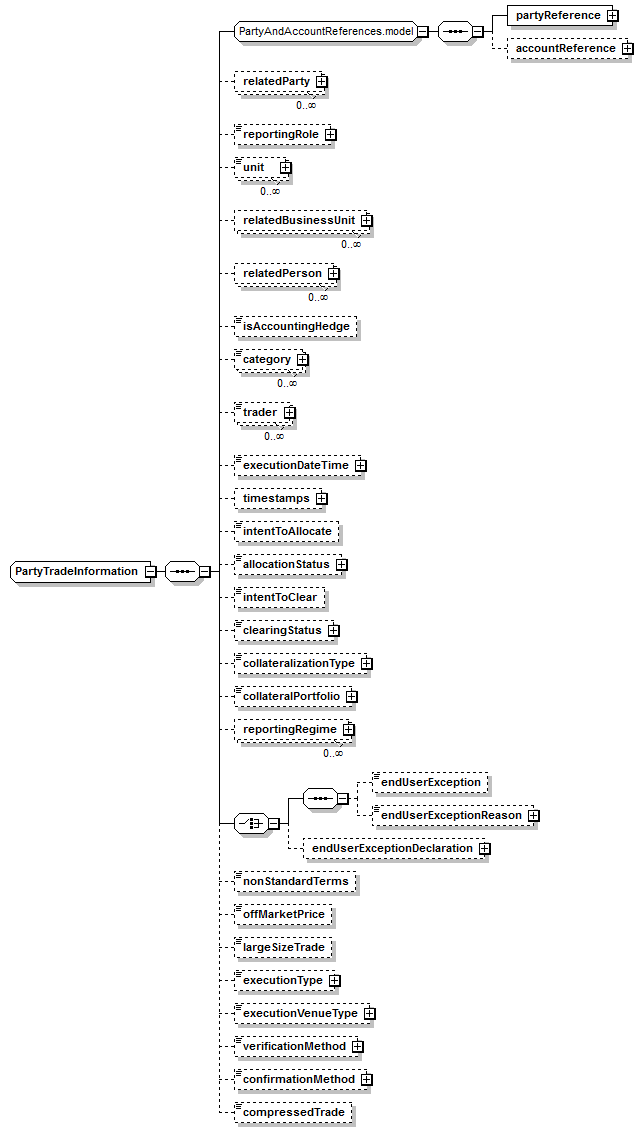
Namespace: |
|
Content: |
complex, 30 elements |
Defined: |
globally in fpml-doc-5-8.xsd; see XML source |
Includes: |
definitions of 28 elements |
Used: |
at 3 locations |

XML Representation Summary |
|||
<...> |
|||
</...> |
|||
|
<xsd:sequence>
<xsd:group ref="PartyAndAccountReferences.model"/>
<xsd:element fpml-annotation:deprecatedReason="This element is deprecated in favor of the reportingRole within reportingRegime." minOccurs="0" name="reportingRole" type="ReportingRole"/>
<xsd:element fpml-annotation:deprecatedReason="This element is deprecated in favor of relatedBusinessUnit." maxOccurs="unbounded" minOccurs="0" name="unit" type="Unit"/>
<xsd:element maxOccurs="unbounded" minOccurs="0" name="relatedBusinessUnit" type="RelatedBusinessUnit"/>
<xsd:choice>
<xsd:sequence>
</xsd:sequence>
</xsd:choice>
</xsd:sequence>
</xsd:complexType>
|
Type: |
AllocationReportingStatus, simple content |
|
xsd:normalizedString
|
maxLength: |
255
|
minLength: |
0
|
Type: |
TradeCategory, simple content |
|
xsd:normalizedString
|
maxLength: |
255
|
minLength: |
0
|
Type: |
ClearingStatusValue, simple content |
|
xsd:normalizedString
|
maxLength: |
255
|
minLength: |
0
|
Type: |
CollateralizationType, simple content |
|
xsd:normalizedString
|
maxLength: |
255
|
minLength: |
0
|
Type: |
PortfolioName, simple content |
|
xsd:normalizedString
|
maxLength: |
255
|
minLength: |
1
|
Type: |
xsd:boolean, predefined, simple content |
Type: |
ConfirmationMethod, simple content |
|
xsd:normalizedString
|
maxLength: |
255
|
minLength: |
0
|
Type: |
xsd:boolean, predefined, simple content |
Type: |
EndUserExceptionDeclaration, complex content |
Type: |
ClearingExceptionReason, simple content |
|
xsd:normalizedString
|
maxLength: |
255
|
minLength: |
0
|
Type: |
ExecutionDateTime, simple content |
|
xsd:dateTime
|
Type: |
ExecutionType, simple content |
|
xsd:normalizedString
|
maxLength: |
255
|
minLength: |
0
|
Type: |
ExecutionVenueType, simple content |
|
xsd:normalizedString
|
maxLength: |
255
|
minLength: |
0
|
Type: |
xsd:boolean, predefined, simple content |
Type: |
xsd:boolean, predefined, simple content |
Type: |
xsd:boolean, predefined, simple content |
Type: |
xsd:boolean, predefined, simple content |
Type: |
xsd:boolean, predefined, simple content |
Type: |
xsd:boolean, predefined, simple content |
Type: |
RelatedBusinessUnit, complex content |
|
<xsd:element maxOccurs="unbounded" minOccurs="0" name="relatedBusinessUnit" type="RelatedBusinessUnit"/>
|
Type: |
RelatedParty, complex content |
Type: |
RelatedPerson, complex content |
Type: |
ReportingRegime, complex content |
Type: |
ReportingRole, simple content |
|
xsd:normalizedString
|
maxLength: |
255
|
minLength: |
0
|
|
<xsd:element fpml-annotation:deprecatedReason="This element is deprecated in favor of the reportingRole within reportingRegime." minOccurs="0" name="reportingRole" type="ReportingRole"/>
|
Type: |
TradeProcessingTimestamps, complex content |
Type: |
Trader, simple content |
|
xsd:normalizedString
|
maxLength: |
255
|
minLength: |
0
|
Type: |
Unit, simple content |
|
xsd:normalizedString
|
maxLength: |
255
|
minLength: |
0
|
Type: |
VerificationMethod, simple content |
|
xsd:normalizedString
|
maxLength: |
255
|
minLength: |
0
|
|
XML schema documentation generated with DocFlex/XML 1.9.0 using DocFlex/XML XSDDoc 2.8.0 template set. All content model diagrams generated by Altova XMLSpy via DocFlex/XML XMLSpy Integration.
|